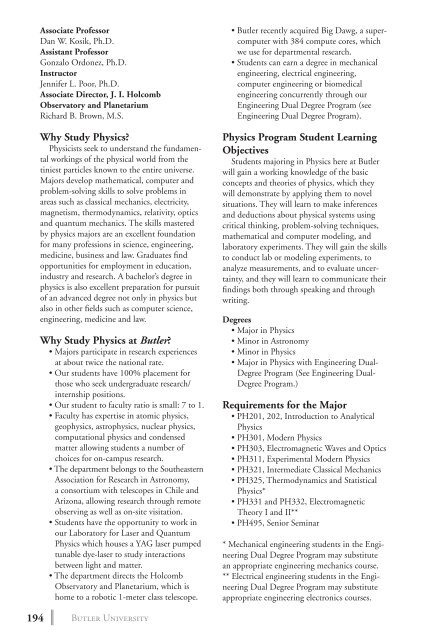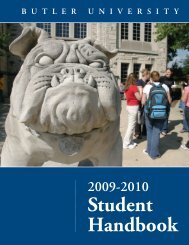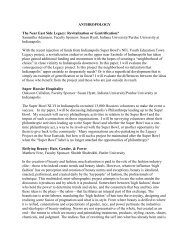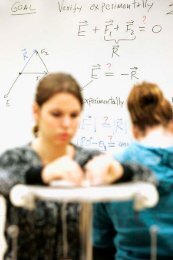2 0 1 3 bulletin - Butler University
2 0 1 3 bulletin - Butler University
2 0 1 3 bulletin - Butler University
You also want an ePaper? Increase the reach of your titles
YUMPU automatically turns print PDFs into web optimized ePapers that Google loves.
Associate Professor<br />
Dan W. Kosik, Ph.D.<br />
Assistant Professor<br />
Gonzalo Ordonez, Ph.D.<br />
Instructor<br />
Jennifer L. Poor, Ph.D.<br />
Associate Director, J. I. Holcomb<br />
Observatory and Planetarium<br />
Richard B. Brown, M.S.<br />
Why Study Physics?<br />
Physicists seek to understand the fundamental<br />
workings of the physical world from the<br />
tiniest particles known to the entire universe.<br />
Majors develop mathematical, computer and<br />
problem-solving skills to solve problems in<br />
areas such as classical mechanics, electricity,<br />
magnetism, thermodynamics, relativity, optics<br />
and quantum mechanics. The skills mastered<br />
by physics majors are an excellent foundation<br />
for many professions in science, engineering,<br />
medicine, business and law. Graduates find<br />
opportunities for employment in education,<br />
industry and research. A bachelor’s degree in<br />
physics is also excellent preparation for pursuit<br />
of an advanced degree not only in physics but<br />
also in other fields such as computer science,<br />
engineering, medicine and law.<br />
Why Study Physics at <strong>Butler</strong>?<br />
• Majors participate in research experiences<br />
at about twice the national rate.<br />
• Our students have 100% placement for<br />
those who seek undergraduate research/<br />
internship positions.<br />
• Our student to faculty ratio is small: 7 to 1.<br />
• Faculty has expertise in atomic physics,<br />
geophysics, astrophysics, nuclear physics,<br />
computational physics and condensed<br />
matter allowing students a number of<br />
choices for on-campus research.<br />
• The department belongs to the Southeastern<br />
Association for Research in Astronomy,<br />
a consortium with telescopes in Chile and<br />
Arizona, allowing research through remote<br />
observing as well as on-site visitation.<br />
• Students have the opportunity to work in<br />
our Laboratory for Laser and Quantum<br />
Physics which houses a YAG laser pumped<br />
tunable dye-laser to study interactions<br />
between light and matter.<br />
• The department directs the Holcomb<br />
Observatory and Planetarium, which is<br />
home to a robotic 1-meter class telescope.<br />
• <strong>Butler</strong> recently acquired Big Dawg, a supercomputer<br />
with 384 compute cores, which<br />
we use for departmental research.<br />
• Students can earn a degree in mechanical<br />
engineering, electrical engineering,<br />
computer engineering or biomedical<br />
engineering concurrently through our<br />
Engineering Dual Degree Program (see<br />
Engineering Dual Degree Program).<br />
Physics Program Student Learning<br />
Objectives<br />
Students majoring in Physics here at <strong>Butler</strong><br />
will gain a working knowledge of the basic<br />
concepts and theories of physics, which they<br />
will demonstrate by applying them to novel<br />
situations. They will learn to make inferences<br />
and deductions about physical systems using<br />
critical thinking, problem-solving techniques,<br />
mathematical and computer modeling, and<br />
laboratory experiments. They will gain the skills<br />
to conduct lab or modeling experiments, to<br />
analyze measurements, and to evaluate uncertainty,<br />
and they will learn to communicate their<br />
findings both through speaking and through<br />
writing.<br />
Degrees<br />
• Major in Physics<br />
• Minor in Astronomy<br />
• Minor in Physics<br />
• Major in Physics with Engineering Dual-<br />
Degree Program (See Engineering Dual-<br />
Degree Program.)<br />
Requirements for the Major<br />
• PH201, 202, Introduction to Analytical<br />
Physics<br />
• PH301, Modern Physics<br />
• PH303, Electromagnetic Waves and Optics<br />
• PH311, Experimental Modern Physics<br />
• PH321, Intermediate Classical Mechanics<br />
• PH325, Thermodynamics and Statistical<br />
Physics*<br />
• PH331 and PH332, Electromagnetic<br />
Theory I and II**<br />
• PH495, Senior Seminar<br />
* Mechanical engineering students in the Engineering<br />
Dual Degree Program may substitute<br />
an appropriate engineering mechanics course.<br />
** Electrical engineering students in the Engineering<br />
Dual Degree Program may substitute<br />
appropriate engineering electronics courses.<br />
194<br />
<strong>Butler</strong> <strong>University</strong>
















